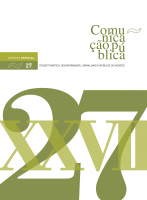How laws are defining (and criminalizing) fake news
DOI:
https://doi.org/10.4000/cp.5423Keywords:
fake news, misinformation, internet, social networks, humourAbstract
Legislative initiatives to combat misinformation and fake news from Germany, Brazil, France, Malaysia or Singapore have generated considerable controversy, and not just in these countries. As these are pioneering initiatives, they have received much attention across borders. In this paper, we analyse how each of these five legislative initiatives frames the fake news issue to conclude that the vast majority focus on the falseness of documents or statements made online. The different legislative proposals are minimalist and little explanatory, seeming to function as experiments or tests, with more deterrent than criminalizing aims.
Downloads
References
Bakir, V., & McStay, A. (2018). Fake News and The Economy of Emotions: Problems, causes, solutions. Digital Journalism, 6(2), 154–175. Disponível em http://doi.org/10.1080/21670811.2017.1345645 [Consult. em 13 de setembro de 2019]. DOI : 10.1080/21670811.2017.1345645 good / bad
Berkowitz, D. & Schwartz, D. A. (2016). Miley, CNN and The Onion: When fake news becomes realer than real. Journalism Practice. Disponível em https://www.tandfonline.com/doi/abs/10.1080/17512786.2015.1006933 [Consult. em 6 de novembro de 2019]. DOI : 10.1080/17512786.2015.1006933 good / bad
Campbell, A. (2019). How data privacy laws can fight “fake news”. Just Security Disponível em https://www.justsecurity.org/65795/how-data-privacy-laws-can-fight-fake-news/ [Consult. em 12 de setembro de 2019].
Funke, D. & Famini, D., A guide to anti-misinformation actions around the world. Poynter Institute. https://www.poynter.org/ifcn/anti-misinformation-actions/ [Consult. em 12 de setembro de 2019].
Gelfert, A. (2018). Fake news: A definition. Informal Logic, 38(1), 84-117. Disponível em http://tu-berlin.academia.edu/AxelGelfert [Consult. em 13 de setembro de 2019].
Gettings, M. (2007). The fake, the false, and the fictional: The Daily Show as new source. In Holt, J. (ed.). The Daily Show and Philosophy, (pp. 16-27). Oxford, Reino Unido: Blackwell.
Guess, A., Nyhan, B. & Reifler, J. (2018). Selective Exposure to Misinformation: Evidence from the consumption of fake news during the 2016 U.S. presidential campaign. Disponível em http://www.dartmouth.edu/~nyhan/fake-news-2016.pdf [Consult. em 5 de novembro de 2019].
Haciyakupoglu, G., Yang Hui, J., Suguna, V. S., Leong, D. e Rahman, M. F. A. (2018). Countering “fake news” – A survey of recent global initiatives. RSIS. Disponível em https://www.rsis.edu.sg/rsis-publication/cens/countering-fake-news-a-survey-of-recent-global-initiatives/ [Consult. em 12 de setembro de 2019].
Klein, D. O. & Wueller, J. R. (2017), “Fake news”: A Legal Perspective. Journal of Internet Law, 20(10), abril 2017. Disponível em https://papers.ssrn.com/sol3/papers.cfm?abstract_id=2958790 [Consult. em 11 de setembro de 2019].
Law Library of Congress. (2019). Initiatives to Counter Fake News in Selected Countries. Disponível em https://www.loc.gov/law/help/fake-news/counter-fake-news.pdf [Consult. em 11 de novembro de 2019].
Lazer et al. (2018) The Science of fake news. Science 359(6380), 1094-1096. Disponível emhttps://science.sciencemag.org/content/359/6380/1094 [Consult. em 13 de setembro de 2019].
Meneses, J. P. (2018). Sobre a necessidade de conceptualizar o fenómeno das fake news. Observatorio (OBS*) Special Issue (2018), 37-53. Disponível em http://obs.obercom.pt/index.php/obs/article/view/1376 [Consult. em 13 de setembro de 2019].
Nery, J. (2019). A necessary controversy: Defining fake news. Friedrich Naumann Stiftung. Disponível em https://asia.fnst.org/content/necessary-controversy-defining-fake-news; [Consult. em 13 de setembro de 2019].
Pangrazio, L. (2018). What’s new about ‘fake news’? Critical digital literacies in an era of fake news, post-truth and clickbait. Pág. Educ., 11(1), 6-22. Disponível em http://dx.doi.org/10.22235/pe.v11i1.1551 [Consult. em 13 de setembro de 2019]. DOI : 10.22235/pe.v11i1.1551 good / bad
Reilly, I. (2018). F for Fake: Propaganda! Hoaxing! Hacking! Partisanship! and Activism! in the Fake News Ecology. In The Journal of American Culture. Disponível em https://doi.org/10.1111/jacc.12834 [Consult. em 6 de novembro de 2019]. DOI : 10.1111/jacc.12834 good / bad
Richard-Thomson. (2019). Infox ! Le grand livre des Fake News. Paris, França: Desinge & Hugo & Cie.
Rini, R. (2017). Fake News and Partisan Epistemology. Kennedy Institute of Ethics Journal, 27(S2), 43-64. Disponível em https://muse.jhu.edu/article/670860 [Consult. em 13 de setembro de 2019].
Tan, E. G. & Ang, B. (2017). Clickbait: Fake News and Role of the State. RSIS. Disponível em https://www.rsis.edu.sg/rsis-publication/cens/co17026-clickbait-fake-news-and-role-of-the-state/#.W37J_ejFjIV [Consult. em 6 de novembro de 2019].
Tandoc Jr, E. C., Lim, Z. W. & Ling, R. (2017). Defining “Fake News” A typology of scholarly definitions. Digital Journalism, 6. Disponível em https://www.tandfonline.com/doi/citedby/10.1080/21670811.2017.1360143?scroll=top&needAccess=true [Consult. em 11/11/2019].
Torres, R., Gerhart, N. & Negahban, A. (2018). Epistemology in the Era of Fake News: An Exploration of Information Verification Behaviors among Social Networking Site Users.ACM, Digital Library. Disponível em https://dl.acm.org/citation.cfm?id=3242734.3242740 [Consult. em 13 de setembro de 2019].
Verstraete, M., Bambauer, D. E. & Bambauer, J. R. (2017). Identifying and Countering fake news. Arizona Legal Studies Discussion Paper No. 17-15 Disponível em https://papers.ssrn.com/sol3/papers.cfm?abstract_id=3007971 [Consult. em 12 de setembro de 2019]. DOI : 10.2139/ssrn.3007971 good / bad
Wardle, C. & Derakhshan, H. (2017). Information Disorder, Toward an interdisciplinary framework for research and policymaking. Council of Europe. Disponível em https://rm.coe.int/information-disorder-toward-an-interdisciplinary-framework-for-researc/168076277c [Consult. em 13 de setembro de 2019].
Zannettou, S., Sirivianos, M., Blackburn, J. & Kourtellis, N. (2018). The Web of False Information: Rumors, Fake News, Hoaxes, Clickbait, and Various Other Shenanigans. Cornell University Library. Disponível em https://arxiv.org/abs/1804.03461 [Consult. em em 6 de novembro de 2019].
Downloads
Published
Issue
Section
License
Copyright (c) 2019 Direitos do Autor (c) 2019

This work is licensed under a Creative Commons Attribution-NonCommercial 4.0 International License.
Os conteúdos da Comunicação Pública estão licenciados com uma licença Creative Commons - Atribuição-NãoComercial 4.0 Internacional.


